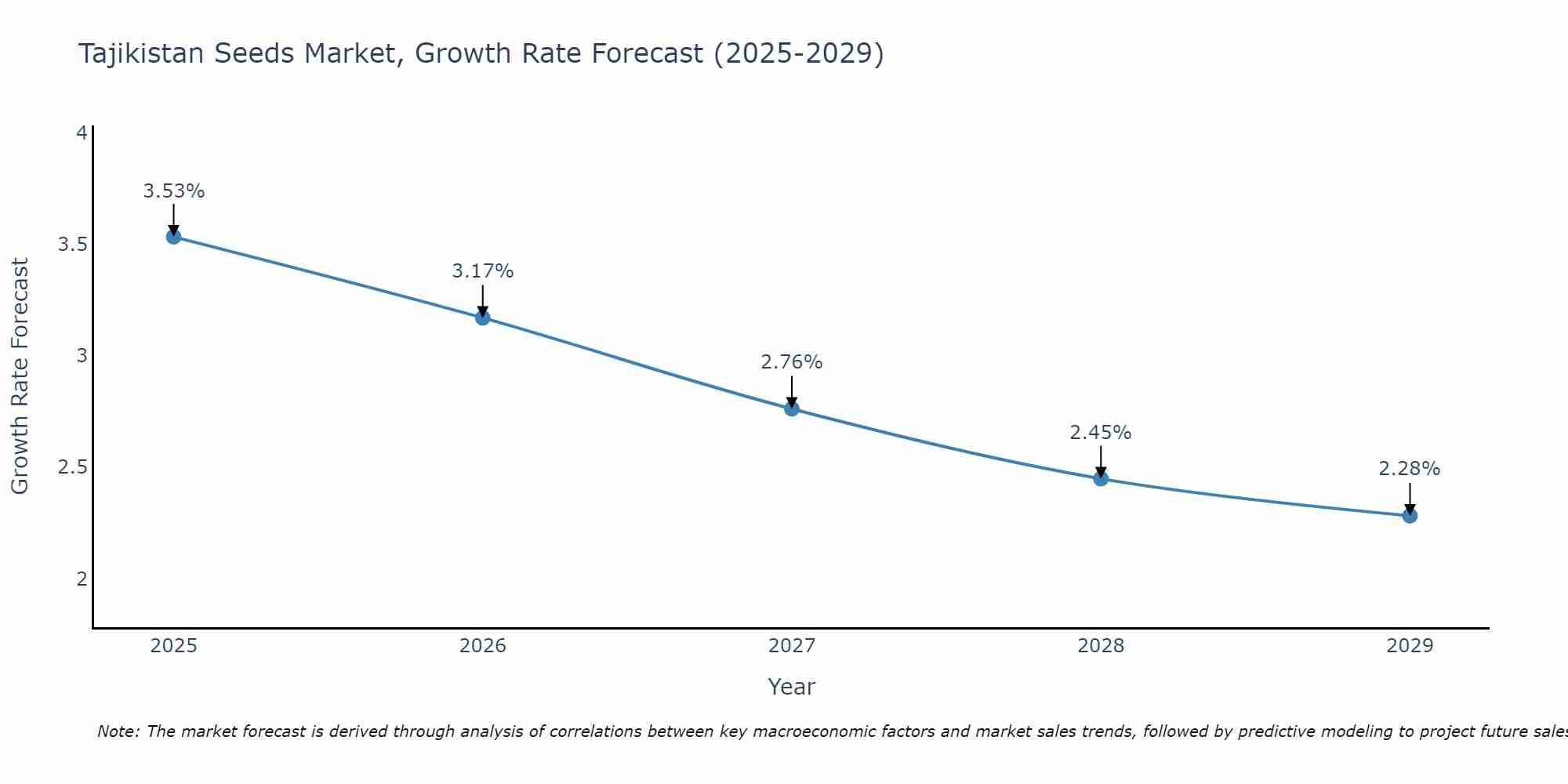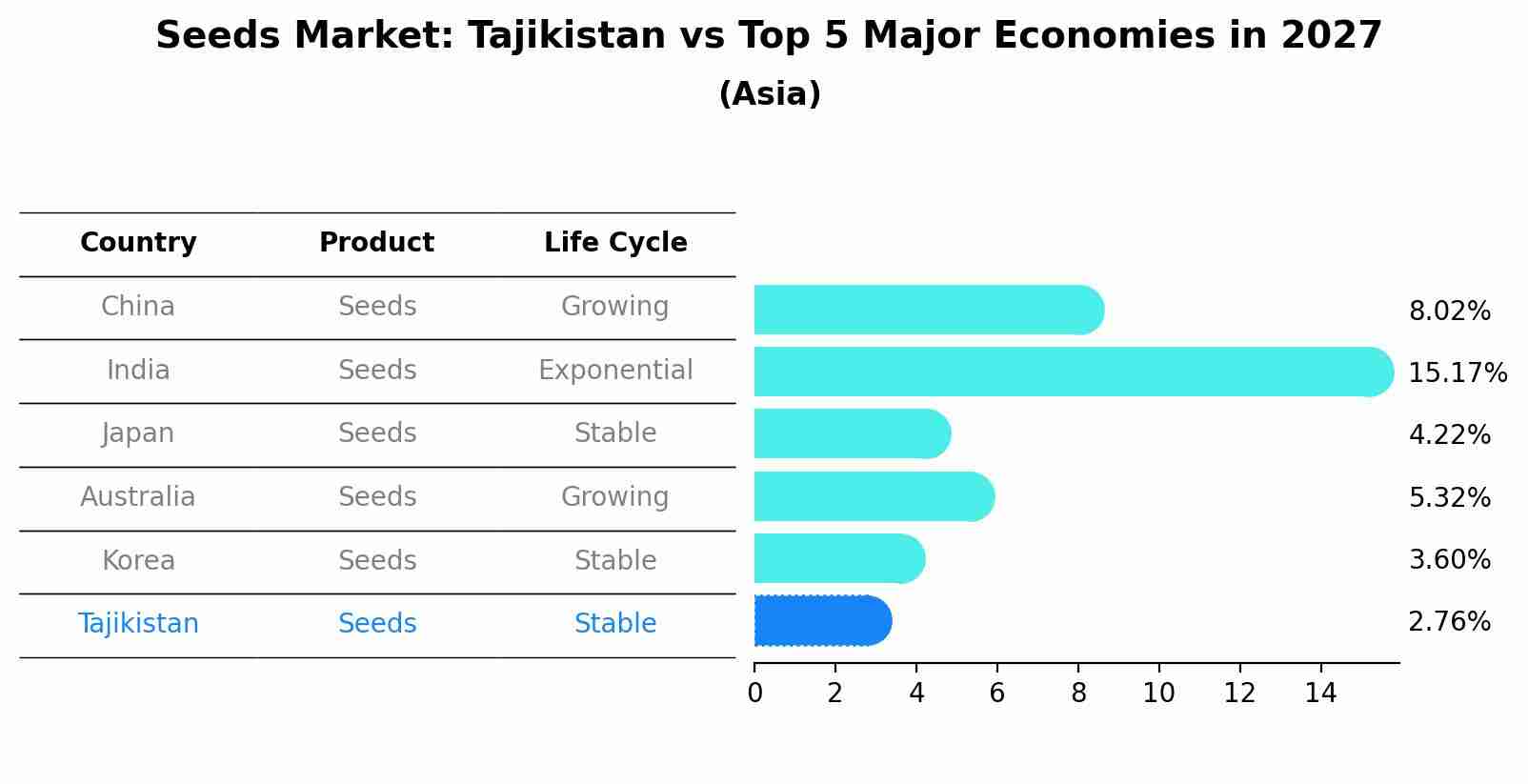Tajikistan Seeds Market Outlook | Size, Trends, Industry, Share, Revenue, Companies, Analysis, Value, Growth, COVID-19 IMPACT & Forecast
| Product Code: ETC384719 | Publication Date: Aug 2022 | Updated Date: Jul 2025 | Product Type: Market Research Report | |
| Publisher: 6Wresearch | Author: Dhaval Chaurasia | No. of Pages: 75 | No. of Figures: 35 | No. of Tables: 20 |
Tajikistan Seeds Market Size Growth Rate
The Tajikistan Seeds Market may undergo a gradual slowdown in growth rates between 2025 and 2029. Beginning strongly at 3.53% in 2025, growth softens to 2.28% in 2029.

Seeds Market: Tajikistan vs Top 5 Major Economies in 2027 (Asia)
Tajikistan's Seeds market is anticipated to experience a stable growth rate of 2.76% by 2027, reflecting trends observed in the largest economy China, followed by India, Japan, Australia and South Korea.

Tajikistan Seeds Market Synopsis
The Tajikistan seeds market is experiencing steady growth due to increasing demand for high-quality seeds for various crops such as wheat, cotton, fruits, and vegetables. The market is primarily driven by a growing agricultural sector and government initiatives to modernize farming practices. Domestic seed production is gradually increasing, but the country still relies on imports to meet its seed requirements. Key players in the Tajikistan seeds market include both domestic seed producers and international companies. Factors such as changing climate patterns and a focus on sustainable agriculture practices are also influencing the market dynamics. Overall, the Tajikistan seeds market presents opportunities for seed companies to introduce innovative products and technologies to support the country`s agricultural development.
Tajikistan Seeds Market Trends
The Tajikistan Seeds Market is experiencing a shift towards the demand for high-quality and certified seeds, particularly in the agriculture sector. There is a growing awareness among farmers about the importance of using improved varieties of seeds to enhance crop yields and quality. Hybrid seeds, in particular, are gaining popularity due to their potential for higher productivity and disease resistance. Additionally, there is a rising interest in organic and non-GMO seeds as consumers become more health-conscious. The market is also witnessing an increase in the availability of seeds for various crops, including fruits, vegetables, and cereals, catering to the diverse needs of farmers. Overall, the Tajikistan Seeds Market is moving towards sustainability, innovation, and efficiency in order to meet the evolving demands of the agricultural sector.
Tajikistan Seeds Market Challenges
The Tajikistan seeds market faces several challenges, including limited access to high-quality seeds, inadequate infrastructure for seed production and distribution, and a lack of modern farming techniques and technologies. The country`s mountainous terrain and harsh climatic conditions also present obstacles to efficient seed cultivation and farming practices. Additionally, there is a need for improved regulatory frameworks and enforcement to ensure the quality and authenticity of seeds available in the market. These challenges collectively hamper the growth and productivity of the agricultural sector in Tajikistan and impede farmers` ability to achieve optimal yields and profitability. Addressing these challenges would require investments in infrastructure, technology transfer, capacity building, and policy reforms to enhance the overall competitiveness and sustainability of the seeds market in Tajikistan.
Tajikistan Seeds Market Investment Opportunities
The Tajikistan Seeds Market presents promising investment opportunities due to the country`s agricultural sector`s growth potential and increasing demand for high-quality seeds. With a significant portion of the population engaged in agriculture, there is a growing need for improved crop varieties to enhance productivity and resilience to climate change. Investors can explore opportunities in supplying certified seeds, introducing innovative seed technologies, and investing in seed production facilities to cater to the local market and potentially expand into regional markets. Additionally, collaborations with local farmers and agricultural organizations can provide valuable insights and partnerships for successful market penetration. Overall, investing in the Tajikistan Seeds Market offers the potential for long-term growth and impact in supporting the country`s agricultural development.
Jordan Agar Market Government Policies
The Tajikistan government has implemented policies to regulate the seeds market in the country, aiming to promote agricultural productivity and ensure food security. These policies include the issuance of licenses for seed production and distribution, quality control measures to maintain seed purity and germination rates, and the establishment of seed certification systems to guarantee the authenticity of seeds. Additionally, the government offers subsidies and support programs to encourage farmers to use certified seeds and adopt modern agricultural practices. These policies are designed to enhance the efficiency and sustainability of the seeds market in Tajikistan, ultimately benefiting both farmers and consumers by improving crop yields and quality.
Tajikistan Seeds Market Future Outlook
The future outlook for the Tajikistan Seeds Market appears promising, driven by factors such as increasing government support for agriculture, rising demand for high-quality seeds to enhance crop production, and growing awareness among farmers about the benefits of using certified seeds. Additionally, the shift towards modern farming techniques and technologies is expected to fuel the adoption of improved seed varieties in Tajikistan. With a focus on improving crop yield, quality, and resilience to climate change, the seeds market in Tajikistan is likely to witness steady growth in the coming years. However, challenges such as limited access to finance for smallholder farmers and the need for further research and development in seed technology remain key factors that may impact market growth. Overall, opportunities for seed companies in Tajikistan are expected to expand as the agricultural sector continues to evolve and develop.
Key Highlights of the Report:
- Tajikistan Seeds Market Outlook
- Market Size of Tajikistan Seeds Market, 2021
- Forecast of Tajikistan Seeds Market, 2031
- Historical Data and Forecast of Tajikistan Seeds Revenues & Volume for the Period 2018 - 2031
- Tajikistan Seeds Market Trend Evolution
- Tajikistan Seeds Market Drivers and Challenges
- Tajikistan Seeds Price Trends
- Tajikistan Seeds Porter's Five Forces
- Tajikistan Seeds Industry Life Cycle
- Historical Data and Forecast of Tajikistan Seeds Market Revenues & Volume By Type for the Period 2018 - 2031
- Historical Data and Forecast of Tajikistan Seeds Market Revenues & Volume By Genetically Modified (GM) Seed for the Period 2018 - 2031
- Historical Data and Forecast of Tajikistan Seeds Market Revenues & Volume By Conventional Seed for the Period 2018 - 2031
- Historical Data and Forecast of Tajikistan Seeds Market Revenues & Volume By Crop for the Period 2018 - 2031
- Historical Data and Forecast of Tajikistan Seeds Market Revenues & Volume By Field Crops for the Period 2018 - 2031
- Historical Data and Forecast of Tajikistan Seeds Market Revenues & Volume By Fruit & Vegetable Crops for the Period 2018 - 2031
- Historical Data and Forecast of Tajikistan Seeds Market Revenues & Volume By Availability for the Period 2018 - 2031
- Historical Data and Forecast of Tajikistan Seeds Market Revenues & Volume By Commercial Seeds for the Period 2018 - 2031
- Historical Data and Forecast of Tajikistan Seeds Market Revenues & Volume By Saved Seeds for the Period 2018 - 2031
- Historical Data and Forecast of Tajikistan Seeds Market Revenues & Volume By Seed Treatment for the Period 2018 - 2031
- Historical Data and Forecast of Tajikistan Seeds Market Revenues & Volume By Treated for the Period 2018 - 2031
- Historical Data and Forecast of Tajikistan Seeds Market Revenues & Volume By Untreated for the Period 2018 - 2031
- Historical Data and Forecast of Tajikistan Seeds Market Revenues & Volume By Seed Trait for the Period 2018 - 2031
- Historical Data and Forecast of Tajikistan Seeds Market Revenues & Volume By Herbicide Tolerant for the Period 2018 - 2031
- Historical Data and Forecast of Tajikistan Seeds Market Revenues & Volume By Insecticide Resistant for the Period 2018 - 2031
- Historical Data and Forecast of Tajikistan Seeds Market Revenues & Volume By Other Stacked Traits for the Period 2018 - 2031
- Tajikistan Seeds Import Export Trade Statistics
- Market Opportunity Assessment By Type
- Market Opportunity Assessment By Crop
- Market Opportunity Assessment By Availability
- Market Opportunity Assessment By Seed Treatment
- Market Opportunity Assessment By Seed Trait
- Tajikistan Seeds Top Companies Market Share
- Tajikistan Seeds Competitive Benchmarking By Technical and Operational Parameters
- Tajikistan Seeds Company Profiles
- Tajikistan Seeds Key Strategic Recommendations
Frequently Asked Questions About the Market Study (FAQs):
- Single User License$ 1,995
- Department License$ 2,400
- Site License$ 3,120
- Global License$ 3,795
Search
Thought Leadership and Analyst Meet
Our Clients
Related Reports
- Canada Oil and Gas Market (2026-2032) | Share, Segmentation, Value, Industry, Trends, Forecast, Analysis, Size & Revenue, Growth, Competitive Landscape, Outlook, Companies
- Germany Breakfast Food Market (2026-2032) | Industry, Share, Growth, Size, Companies, Value, Analysis, Revenue, Trends, Forecast & Outlook
- Australia Briquette Market (2025-2031) | Growth, Size, Revenue, Forecast, Analysis, Trends, Value, Share, Industry & Companies
- Vietnam System Integrator Market (2025-2031) | Size, Companies, Analysis, Industry, Value, Forecast, Growth, Trends, Revenue & Share
- ASEAN and Thailand Brain Health Supplements Market (2025-2031) | Strategy, Consumer Insights, Analysis, Investment Trends, Opportunities, Growth, Size, Share, Industry, Revenue, Segments, Value, Segmentation, Supply, Forecast, Restraints, Outlook, Competition, Drivers, Trends, Demand, Pricing Analysis, Competitive, Strategic Insights, Companies, Challenges
- ASEAN Bearings Market (2025-2031) | Strategy, Consumer Insights, Analysis, Investment Trends, Opportunities, Growth, Size, Share, Industry, Revenue, Segments, Value, Segmentation, Supply, Forecast, Restraints, Outlook, Competition, Drivers, Trends, Demand, Pricing Analysis, Competitive, Strategic Insights, Companies, Challenges
- Europe Flooring Market (2025-2031) | Outlook, Share, Industry, Trends, Forecast, Companies, Revenue, Size, Analysis, Growth & Value
- Saudi Arabia Manlift Market (2025-2031) | Outlook, Size, Growth, Trends, Companies, Industry, Revenue, Value, Share, Forecast & Analysis
- Uganda Excavator, Crane, and Wheel Loaders Market (2025-2031) | Strategy, Consumer Insights, Analysis, Investment Trends, Opportunities, Growth, Size, Share, Industry, Revenue, Segments, Value, Segmentation, Supply, Forecast, Restraints, Outlook, Competition, Drivers, Trends, Demand, Pricing Analysis, Competitive, Strategic Insights, Companies, Challenges
- Rwanda Excavator, Crane, and Wheel Loaders Market (2025-2031) | Strategy, Consumer Insights, Analysis, Investment Trends, Opportunities, Growth, Size, Share, Industry, Revenue, Segments, Value, Segmentation, Supply, Forecast, Restraints, Outlook, Competition, Drivers, Trends, Demand, Pricing Analysis, Competitive, Strategic Insights, Companies, Challenges
Industry Events and Analyst Meet
Whitepaper
- Middle East & Africa Commercial Security Market Click here to view more.
- Middle East & Africa Fire Safety Systems & Equipment Market Click here to view more.
- GCC Drone Market Click here to view more.
- Middle East Lighting Fixture Market Click here to view more.
- GCC Physical & Perimeter Security Market Click here to view more.
6WResearch In News
- Doha a strategic location for EV manufacturing hub: IPA Qatar
- Demand for luxury TVs surging in the GCC, says Samsung
- Empowering Growth: The Thriving Journey of Bangladesh’s Cable Industry
- Demand for luxury TVs surging in the GCC, says Samsung
- Video call with a traditional healer? Once unthinkable, it’s now common in South Africa
- Intelligent Buildings To Smooth GCC’s Path To Net Zero


















